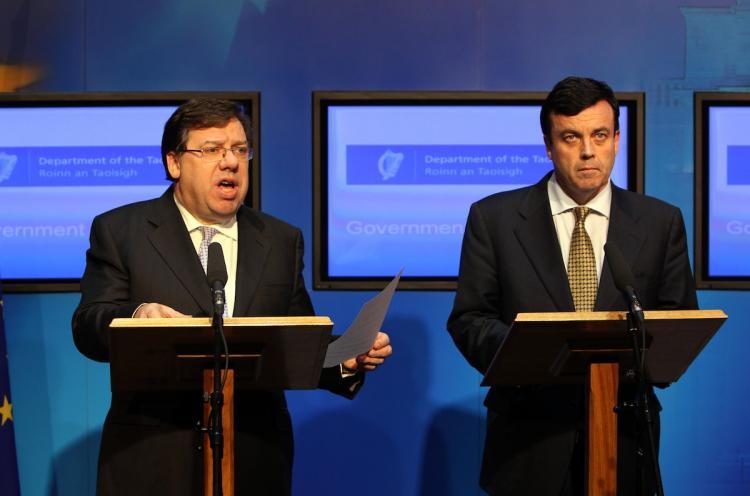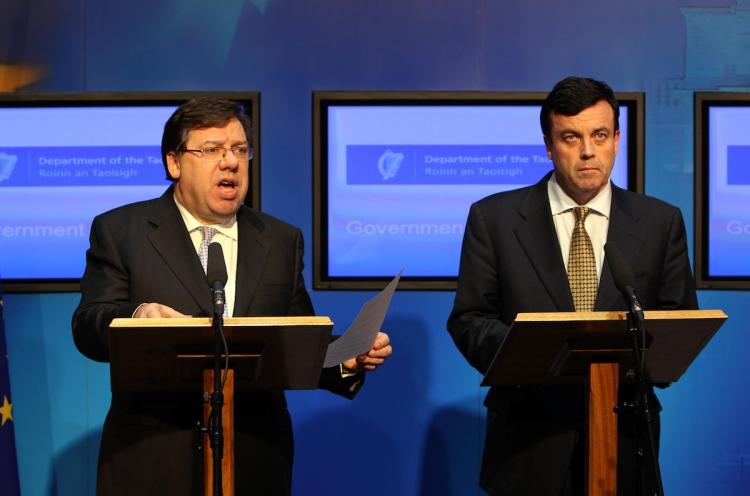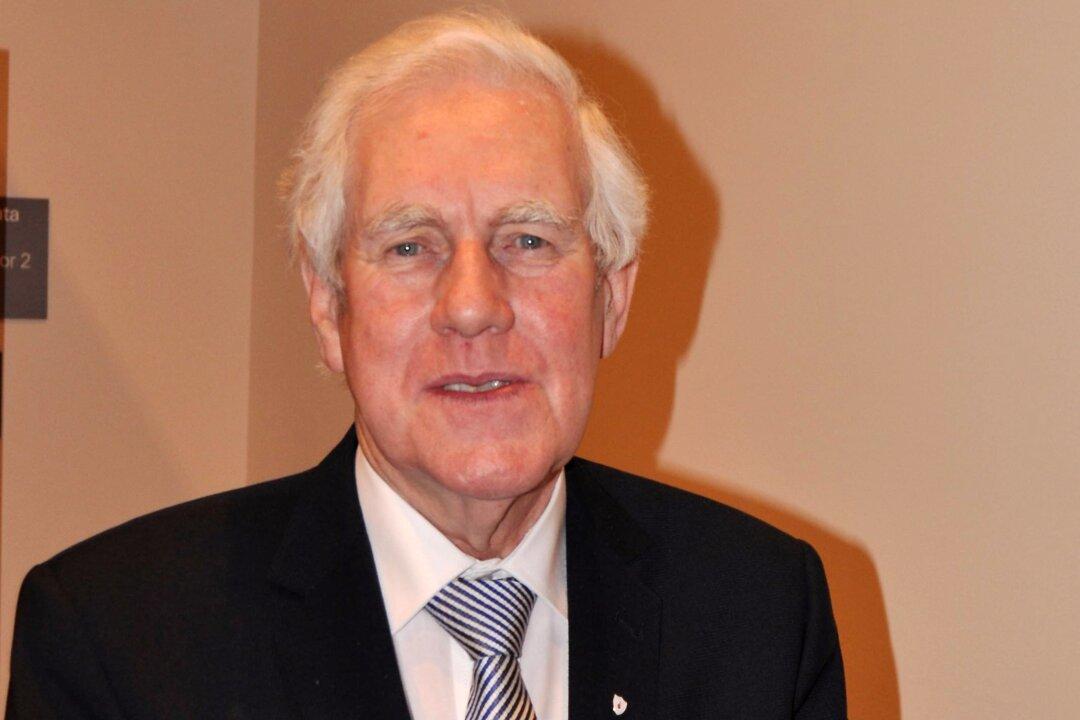DUBLIN—After heightened speculation, Taoiseach (Prime Minister) Brian Cowen announced on Sunday evening that the European Union had endorsed a formal request made by the Irish government for financial aid from the International Monetary Fund (IMF) and the EU.
Speaking at a press conference in government buildings, Cowen commenced by saying, “I want to clearly explain the decisions that we have taken today, and what they mean for our people.”
The government’s request was transmitted to and accepted by European authorities on Sunday evening, said Cowen.
A formal process of negotiation will now commence that will lead to the provision of assistance. The prime minister said that he expected that process, which has been ongoing in Dublin this week, to reach completion over the next few weeks.
He explained that the agreement would include a fund for potential future capital needs of Irish banks, and would also involve restructuring the banking system.
“Irish banks will become significantly smaller than they have been in the past, so they can gradually be brought to stand on their own two feet as before,” said Cowen.
The second key area of the agreement is to bring Ireland’s budget deficit in line with EU requirements. “The government has to increase our taxes and reduce our spending to levels we can afford,” said Cowen.
In order for Ireland to achieve these goals and “safeguard the stability of the euro area,” Cowen said Ireland will receive funding that the country would “repay over time.”
The next step in the process will be the publication of the government’s four-year plan as requested by the EU, which should outline governmental response with respect to getting Ireland’s public finances in line.
The four-year plan should provide measures for the reduction of the deficit by 15 billion euro (US$20.5 billion) by 2014, subject to annual reviews: 5 billion euro will be raised through tax increases and another 10 billion euro in savings will come through spending cuts.
“These will be difficult. Everyone in Ireland will be affected. ... Everyone will know where they stand so they can plan for the future,” said the prime minister.
In closing, Mr. Cowen said he welcomed the support that other EU states had shown to Ireland during the crisis to date. “We are profoundly grateful for the solidarity that Europe has shown to us since this financial crisis has begun. I also acknowledge the enduring support of the United States and our other friends around the world.”
To the Irish people, Cowen said, “We should not underestimate the scale of our economic problems but we must have faith in our ability as a people to recover and prosper once more.”
“We need to show the solidarity in our own country that our neighbors have shown to us at this time,” he concluded.
Minister for Finance Brian Lenihan added that despite the country’s budgetary and banking issues, there remain underlying fundamentals in the Irish economy that are “very sound.” Once adjustments such as downsizing of the banking sector to meet the real needs of the economy takes place, Ireland can take advantage of those underlining fundamentals, he said.
A statement by the Eurogroup said, “Ministers concur with the commission and the ECB [European Central Bank] that providing assistance to Ireland is warranted to safeguard financial stability in the EU and in the euro area.”
The financial assistance package to the Irish state should be financed from the European Financial Stabilization Mechanism (EFSM) and the European Financial Stability Facility (EFSF).
The Eurogroup said there was a possibility that supplemental loans may be issued by EU member states. The United Kingdom and Sweden have, according to Eurogroup, indicated that they are ready to partake in a bilateral loan if requested.
Financial support will be provided under a “strong policy program,” which the Eurogroup said will “address the fiscal challenges of the Irish economy in a decisive manner.”
It will also include a fund for potential future capital requirements of the banking sector.
Dominique Strauss-Kahn, managing director of the IMF, issued a statement that said he welcomed the EU’s response to the Irish government’s request for financial assistance to “safeguard financial stability.”
“At the request of the Irish authorities, the IMF stands ready to join this effort, including through a multiyear loan,” he said.
Strauss-Kahn said that the IMF team, in Ireland for technical talks at present, will now change their focus to discussions on an economic program.
Speaking at a press conference in government buildings, Cowen commenced by saying, “I want to clearly explain the decisions that we have taken today, and what they mean for our people.”
The government’s request was transmitted to and accepted by European authorities on Sunday evening, said Cowen.
A formal process of negotiation will now commence that will lead to the provision of assistance. The prime minister said that he expected that process, which has been ongoing in Dublin this week, to reach completion over the next few weeks.
He explained that the agreement would include a fund for potential future capital needs of Irish banks, and would also involve restructuring the banking system.
“Irish banks will become significantly smaller than they have been in the past, so they can gradually be brought to stand on their own two feet as before,” said Cowen.
The second key area of the agreement is to bring Ireland’s budget deficit in line with EU requirements. “The government has to increase our taxes and reduce our spending to levels we can afford,” said Cowen.
In order for Ireland to achieve these goals and “safeguard the stability of the euro area,” Cowen said Ireland will receive funding that the country would “repay over time.”
The next step in the process will be the publication of the government’s four-year plan as requested by the EU, which should outline governmental response with respect to getting Ireland’s public finances in line.
The four-year plan should provide measures for the reduction of the deficit by 15 billion euro (US$20.5 billion) by 2014, subject to annual reviews: 5 billion euro will be raised through tax increases and another 10 billion euro in savings will come through spending cuts.
“These will be difficult. Everyone in Ireland will be affected. ... Everyone will know where they stand so they can plan for the future,” said the prime minister.
In closing, Mr. Cowen said he welcomed the support that other EU states had shown to Ireland during the crisis to date. “We are profoundly grateful for the solidarity that Europe has shown to us since this financial crisis has begun. I also acknowledge the enduring support of the United States and our other friends around the world.”
To the Irish people, Cowen said, “We should not underestimate the scale of our economic problems but we must have faith in our ability as a people to recover and prosper once more.”
“We need to show the solidarity in our own country that our neighbors have shown to us at this time,” he concluded.
Minister for Finance Brian Lenihan added that despite the country’s budgetary and banking issues, there remain underlying fundamentals in the Irish economy that are “very sound.” Once adjustments such as downsizing of the banking sector to meet the real needs of the economy takes place, Ireland can take advantage of those underlining fundamentals, he said.
A statement by the Eurogroup said, “Ministers concur with the commission and the ECB [European Central Bank] that providing assistance to Ireland is warranted to safeguard financial stability in the EU and in the euro area.”
The financial assistance package to the Irish state should be financed from the European Financial Stabilization Mechanism (EFSM) and the European Financial Stability Facility (EFSF).
The Eurogroup said there was a possibility that supplemental loans may be issued by EU member states. The United Kingdom and Sweden have, according to Eurogroup, indicated that they are ready to partake in a bilateral loan if requested.
Financial support will be provided under a “strong policy program,” which the Eurogroup said will “address the fiscal challenges of the Irish economy in a decisive manner.”
It will also include a fund for potential future capital requirements of the banking sector.
Dominique Strauss-Kahn, managing director of the IMF, issued a statement that said he welcomed the EU’s response to the Irish government’s request for financial assistance to “safeguard financial stability.”
“At the request of the Irish authorities, the IMF stands ready to join this effort, including through a multiyear loan,” he said.
Strauss-Kahn said that the IMF team, in Ireland for technical talks at present, will now change their focus to discussions on an economic program.





